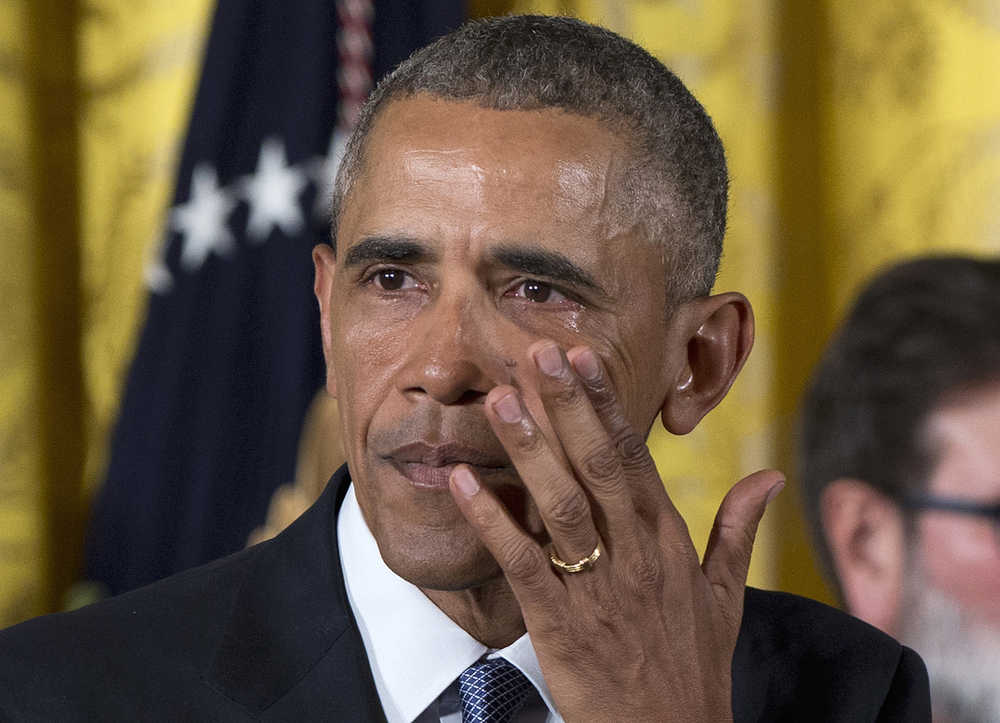WASHINGTON — President Barack Obama, at one point wiping tears from his cheek, unveiled his plan Tuesday to tighten control and enforcement of firearms in the U.S., using his presidential powers in the absence of legal changes he implored Congress to pass.
Obama accused the gun lobby of taking Congress hostage, but said “they cannot hold America hostage.” He insisted it was possible to uphold the Second Amendment while doing something to tackle the frequency of mass shootings in the U.S. that he said had become “the new normal.”
“This is not a plot to take away everybody’s guns,” Obama said in a ceremony in the East Room. “You pass a background check, you purchase a firearm. The problem is some gun sellers have been operating under a different set of rules.”
Obama wiped tears away as he recalled the 20 first-graders killed in 2012 at Sandy Hook Elementary School. He paid tribute to the parents, some of whom gathered for the ceremony, who he said had never imagined their child’s life would be cut short by a bullet.
“Every time I think about those kids, it gets me mad,” Obama said.
At the centerpiece of Obama’s plan is a more sweeping definition of gun dealers that the administration hopes will expand the number of sales subject to background checks. Under current law, only federally licensed gun dealers must conduct background checks on buyers. But at gun shows, websites and flea markets, sellers often skirt that requirement by declining to register as licensed dealers.
Aiming to narrow that loophole, the Justice Department’s Bureau of Alcohol, Tobacco, Firearms and Explosives is issuing updated guidance that says the government should deem anyone “in the business” of selling guns to be a dealer, regardless of where he or she sells the guns. To that end, the government will consider other factors, including how many guns a person sells, how frequently, and whether those guns are sold for a profit.
The White House also put gun sellers on notice that the administration planned to strengthen enforcement — including deploying 230 new examiners the FBI will hire to process background checks.
The impact of Obama’s plan on gun violence remains a major question, and one not easily answered. Had the rules been in place in the past, the steps wouldn’t likely have prevented any of the recent mass shootings that have garnered national attention. The Obama administration acknowledged it couldn’t quantify how many gun sales would be newly subjected to background checks, nor how many currently unregistered gun sellers would have to obtain a license.
Pushing back on that critique, Obama said every time the issue is debated, gun rights groups argue the steps wouldn’t necessarily have stopped the last massacre, “so why bother trying?”
“I reject that thinking,” Obama said, arguing it would be worth it if the measures would prevent even a single gun death. “We maybe can’t save everybody, but we could save some.”
To lend a personal face to the issue, the White House assembled a cross-section of Americans whose lives were altered by the nation’s most searing recent gun tragedies, including former Rep. Gabrielle Giffords and relatives of victims from Charleston, S.C., at Virginia Tech. Mark Barden, whose son was shot to death at Sandy Hook Elementary School, introduced the president with a declaration that “we are better than this.”
Invoking the words of Martin Luther King Jr., Obama said, “We need to feel the fierce urgency of now.”
Obama’s actions carved a predictably partisan fault line through the presidential campaign. Hillary Clinton and Bernie Sanders, both competing for the nomination from Obama’s party, praised the president and pledged to build on his actions if elected. The Republican field formed a chorus of voices vowing to annul the whole package, with Marco Rubio claiming Obama was “Obama is obsessed with undermining the Second Amendment.”
In Congress, Democrats and Republicans similarly lined up on opposite sides. House Democratic leader Nancy Pelosi said Obama was acting within his “clear authority,” but echoed his call for Congress to finish the job. But House Speaker Paul Ryan predicted a certain challenge in the courts.
“Rather than focus on criminals and terrorists, he goes after the most law-abiding of citizens,” said Ryan, R-Wis. “His words and actions amount to a form of intimidation that undermines liberty.”
For Obama, the executive actions mark a return late in his presidency to an issue he’s elevated time and again but has been unable until now to advance. By bypassing Congress, though, Obama is limited to steps far more modest than what he and likeminded lawmakers had long envisioned.
After the Sandy Hook shooting, Obama in 2013, Obama sought far-reaching, bipartisan legislation that went beyond background checks to ban certain assault-style weapons and cap the size of ammunition clips. When the effort collapsed in the Senate, the White House said it was thoroughly researching the president’s powers to identify every legal step he could take on his own. A more recent spate of gun-related atrocities, including in San Bernardino, California, shootings have spurred the administration to give the issue another look.
___
Reach Josh Lederman on Twitter at http://twitter.com/joshledermanAP. His work can be found at http://bigstory.ap.org/author/josh-lederman

